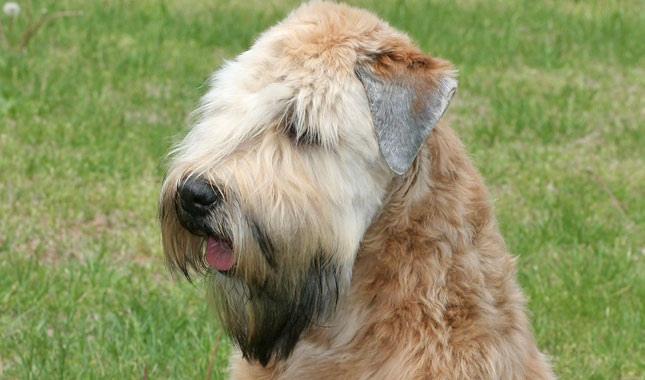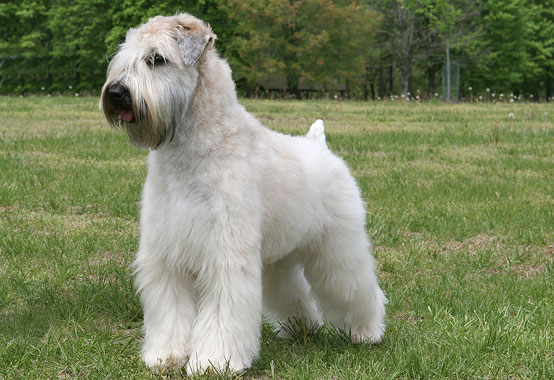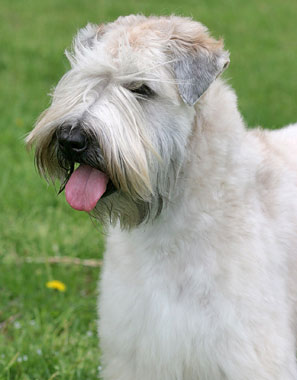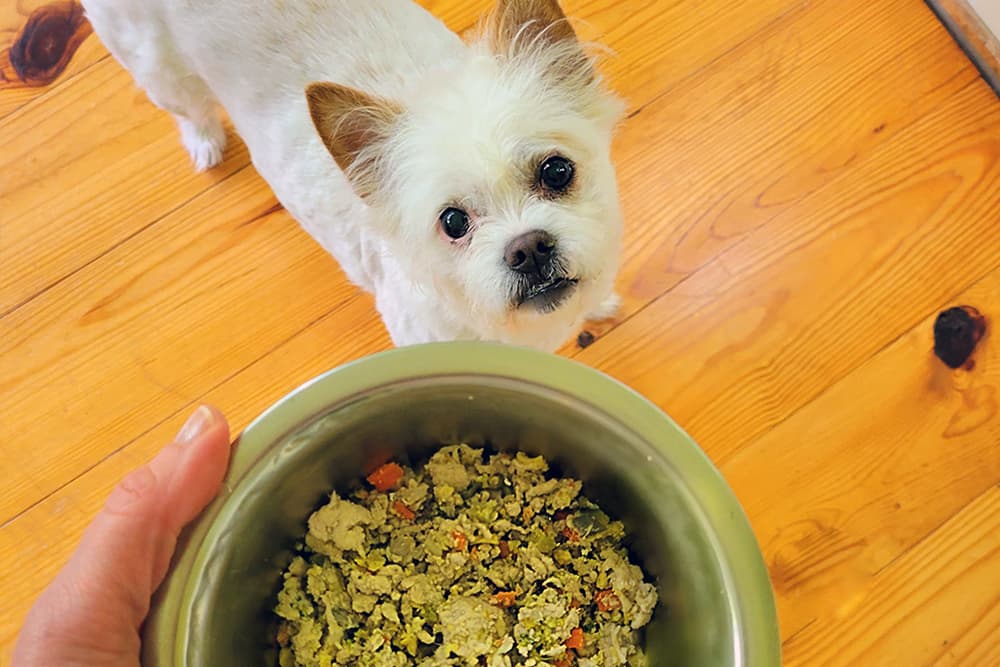Soft Coated Wheaten Terrier
Published on July 14, 2011
Breed Details
- Height: 16 to 18 inches at the shoulder
- Weight: 30 to 40 pounds
Breed Characteristics
Adaptability
Trainability
Grooming
Apartament Friendly
Child Friendly
Shedding Level
Dog Friendly
Exercise Needs
Territorial
Barking Tendencies
Health Issues
Social Needs
Energy Level
Affectionate
Watchdog Instincts
Cat Friendly
Intelligence
Stranger Friendly
The sweetie Wheatie is happy, affectionate, and just a little bit stubborn. He jumps and twirls when he’s happy. The soft coat that gives him his name is lovely to touch but needs a lot of grooming to stay that way. He’s devoted to his family and makes a good watchdog.
The Soft Coated Wheaten Terrier isn’t just softer to the touch than many of the terriers; he’s a little softer in personality, too. Think of him as a terrier with the roughest edges gone. He’s a little quieter than other terriers, a little less scrappy, slightly less driven to dig — but still as likely to consider small wildlife and neighborhood cats well worth chasing. In other words, he may be a little bit softer in comparison to other terriers, but he’s no wimp. Somewhere in his DNA must also be the code for springs in his feet, because the Wheaten loves to bounce and jump – over low fences and on people, too.
Many people fall in love with the Soft Coated Wheaten Terrier for the wrong reasons: Wheaten puppies are adorable, with long, silky coats in a warm shade of light brown (hence: Wheaten). But these sweet-looking puppies can become stubborn dogs who are too much to handle for owners unwilling or unable to provide their pets with the proper guidance, training and socialization, and who aren’t prepared to deal with a coat that is a huge chore to keep free of mats and tangles. Although the Wheaten is known for being less feisty than many of his terrier cousins, he’s still not necessarily the greatest dog with young children.
Still, if you’re a terrier fan and daily coat care at home and regular trips to the groomer don’t deter you, the fact that the Wheaten tends towards the less destructive and somewhat quieter end of the terrier spectrum might make all the difference in your decision. Just don’t forget you’ll need to give him fair, consistent training or you’re likely to end up with a badly-behaved dog whose favorite hobbies are escaping from the backyard and jumping on everyone who comes into the house.
Don’t think for a minute your Wheaten is going to live in your backyard. These are very people-oriented dogs, and not only will a Wheaten be unhappy exiled from his family, he’ll let the world know by barking loudly while he excavates your lawn. Why not redirect that terrier enthusiasm into dog sports like agility or obedience or be sure to offer long walks a couple times a day? But keep him on a leash: the Wheaten’s desire to chase anything can get him into a lot of trouble.
Other Quick Facts
- The Wheaten is a medium-size dog with a square body, a rectangular head, brown eyes, small to medium-size ears that hang down with the inside edge lying next to the cheek, and a docked or natural tail carried upright 90 degrees from the back, either straight or slightly curved forward.
- Wheatens have a soft, silky single coat that covers the body in gentle waves. On the head, the hair falls forward to shade the eyes. The coat can be any shade of wheaten, a light tan color.
All featured products are chosen at the discretion of the Vetstreet editorial team and do not reflect a direct endorsement by the author. However, Vetstreet may make a small affiliate commission if you click through and make a purchase.
The History of the Soft Coated Wheaten Terrier
Early terriers in Ireland were small, all-purpose farm dogs that alerted the farmer to strangers or predators, kept down vermin such as mice and rats, and hunted foxes and badgers. Little is known of the Wheaten’s background or development. The Irish Kennel Club did not recognize the dogs as a breed until 1937.
Wheatens were first brought to the United States in the 1940s by Lydia Vogel of Massachusetts, but not much was done as far as showing or breeding them until the late 1950s. The American Kennel Club recognized the Wheaten in 1973. It ranks 59th among the breeds registered by AKC.
Soft Coated Wheaten Terrier Temperament and Personality
The Soft Coated Wheaten temperament is a combination of alert intelligence and steadiness. He is a lively, affectionate dog that is extremely adaptable. No matter his lifestyle, he is happy — as long as he is with his human pack. He is less scrappy than other terriers, though he is still self-confident and independent. He is a good watchdog, and will bark to alert his family to strangers. He is not inclined to be timid or aggressive.
The Soft Coated Wheaten is a great family dog, and can be a good friend to children. His exuberance can overwhelm very young children, so he is probably better suited as a companion for older kids (elementary school and up).
The Wheaten’s steady temperament is predictable, as is his penchant for wandering and chasing cats, squirrels or anything small, fast, and fuzzy. To protect the Wheaten from himself (and keep him safe), make sure the yard is securely fenced and keep him on leash when he’s not in the house or yard. He seems hard-wired to pull on the leash, so practice nice leash manners with him from day one.
Training should begin right away for the Soft Coated Wheaten puppy. Even at 8 weeks old, he is capable of learning good manners. Never wait until he is 6 months old to begin training, or you will have a bigger, more difficult dog to handle. If possible, get him into puppy kindergarten class by the time he is 10 to 12 weeks old, and socialize, socialize, socialize. However, be aware that many puppy training classes require certain vaccines (like kennel cough) to be up to date, and many veterinarians recommend limited exposure to other dogs and public places until puppy vaccines (including rabies, distemper and parvovirus) have been completed. In lieu of formal training, you can begin training your puppy at home and socializing him among family and friends until puppy vaccines are completed. These experiences as a young dog will help him grow into a sensible, calm adult dog.
Wheatens can be difficult to train at times due to their terrier independence, but they respond very well to consistent, patient lessons. They tend to like to jump up on people, and pull on the leash. Correct these bad habits early should they arise.
Talk with a reputable, experienced Soft Coated Wheaten breeder. Describe exactly what you’re looking for in a canine companion, and ask for assistance in selecting a puppy. Breeders see the puppies daily and can make uncannily accurate recommendations once they know something about your lifestyle and personality. Choose a puppy whose parents have nice personalities and who has been well socialized by the breeder from birth.
What You Need To Know About Soft Coated Wheaten Terrier Health
All dogs have the potential to develop genetic health problems, just as all people have the potential to inherit a particular disease. Run, don’t walk, from any breeder who does not offer a health guarantee on puppies, who tells you that the breed is 100 percent healthy and has no known problems, or who tells you that her puppies are isolated from the main part of the household for health reasons. A reputable breeder will be honest and open about health problems in the breed and the incidence with which they occur in her lines.
Breed-specific health problems include protein-losing nephropathy (PLN) and protein-losing enteropathy (PLE), as well as Addison’s Disease, a disorder of the adrenal glands. There are no specific genetic screening tests for these conditions, nor for a kidney disease known as renal dysplasia that affects Soft Coated Wheaten Terriers. However, there are several tests available to help Wheaten owners, as recommended by the Soft Coated Wheaten Terrier Club of America, to diagnose and monitor these conditions when they occur, and your puppy’s breeder should be willing – eager, in fact – to go over the health histories of his parents and their close relatives and discuss how prevalent those particular health concerns are in his lines.
The Soft Coated Wheaten Club of America participates in the Canine Health Information Center, a health database. Before individual Wheatens can be issued a CHIC number, breeders must submit hip evaluations from the Orthopedic Foundation for Animals (OFA) and an eye clearance from the Canine Eye Registration Foundation (CERF). PennHip certification of hips is also accepted.
Remember that after you’ve taken a new puppy into your home, you have the power to protect him from one of the most common health problems: obesity. Keeping a Wheaten at an appropriate weight is one of the easiest ways to extend his life. Make the most of your preventive abilities to help ensure a healthier dog for life.
Once your Soft Coated Wheaten Terrier is 12 weeks of age or older, consider adding probiotic support to their daily regimen. Great Poop offers a high fiber chewable chicken-flavored treat dogs love. Each soft chew supports firmer stools while helping to build up a dog’s immune system.
The Basics of Soft Coated Wheaten Terrier Grooming
The Soft Coated Wheaten has a beautiful wavy coat with a soft and silky texture. It tangles easily, which means daily brushing and combing is essential to keep the coat tangle free. A slicker brush and stainless steel metal comb are the tools of choice for this job. Bathing and trimming every four to six weeks will keep the coat styled.
The rest is basic care. Trim the nails as needed, every week or two. Brush the teeth frequently with a vet-approved pet toothpaste for good overall health and fresh breath. Check the ears weekly for dirt, redness, or a bad odor that can indicate an infection. If the ears look dirty, wipe them out with a cotton ball dampened with a gentle, pH-balanced ear cleaner recommended by your veterinarian.
Be aware that the coat does not develop fully until the dog is mature, so a puppy or adolescent Wheaten may lack the waves seen in the adult coat or have deeper coloring with black tipping, but the proper wheaten color and waves should develop by the time he is 2 years old.
It is important to begin grooming the Wheaten when he is very young. An early introduction teaches the independent Wheaten that grooming is a normal part of his life and to patiently accept the handling and fuss of the grooming process
Finding a Soft Coated Wheaten Terrier
Whether you want to go with a breeder or get your dog from a shelter or rescue, here are some things to keep in mind.
Choosing a Soft Coated Wheaten Terrier Breeder
Finding a good breeder is a great way to find the right puppy. A good breeder will match you with the right puppy, and will without question have done all the health certifications necessary to screen out health problems as much as possible. He or she is more interested in placing pups in the right homes than making big bucks. Be wary of breeders who only tell you the good things about the breed or who promote the dogs as being “good with kids” without any context as to what that means or how it comes about.
Good breeders will welcome your questions about temperament, health clearances and what the dogs are like to live with and come right back at you with questions of their own about what you’re looking for in a dog and what kind of life you can provide for him. A good breeder can tell you about the history of the breed, explain why one puppy is considered pet quality while another is not, and discuss what health problems affect the breed and the steps she takes take to avoid those problems. A breeder should want to be a resource for you throughout your dog’s life.
Look for more information about the Soft Coated Wheaten Terrier and start your search for a good breeder at the website of the Soft Coated Wheaten Terrier Club of America. Choose a breeder who has agreed to abide by the SCWTCA’s code of ethics, which prohibits the sale of puppies to or through pet stores and calls for the breeder to obtain recommended health clearances on dogs before breeding them.
Avoid breeders who only seem interested in how quickly they can unload a puppy on you and whether your credit card will go through. Breeders who offer puppies at one price “with papers” and at a lower price “without papers” are unethical. You should also bear in mind that buying a puppy from websites that offer to ship your dog to you immediately can be a risky venture, as it leaves you no recourse if what you get isn’t exactly what you expected. Put at least as much effort into researching your puppy as you would into choosing a new car or expensive appliance. It will save you money in the long run.
Lots of reputable breeders have websites, so how can you tell who’s good and who’s not? Red flags include puppies always being available, multiple litters on the premises, having your choice of any puppy, and the ability to pay online with a credit card. Those things are convenient, but they are almost never associated with reputable breeders.
Whether you’re planning to get your new best friend from a breeder, a pet store, or another source, don’t forget that old adage “let the buyer beware”. Disreputable breeders and facilities that deal with puppy mills can be hard to distinguish from reliable operations. There’s no 100% guaranteed way to make sure you’ll never purchase a sick puppy, but researching the breed (so you know what to expect), checking out the facility (to identify unhealthy conditions or sick animals), and asking the right questions can reduce the chances of heading into a disastrous situation. And don’t forget to ask your veterinarian, who can often refer you to a reputable breeder, breed rescue organization, or other reliable source for healthy puppies.
The cost of a Soft Coated Wheaten Terrier puppy varies depending on the breeder’s locale, whether the pup is male or female, what titles his parents have, and whether he is best suited for the show ring or a pet home. The puppy you buy should have been raised in a clean home environment, from parents with health clearances and conformation (show) and, ideally, working titles to prove that they are good specimens of the breed. Puppies should be temperament tested, vetted, dewormed, and socialized to give them a healthy, confident start in life.
Before you decide to buy a puppy, consider whether an adult Soft Coated Wheaten Terrier might better suit your needs and lifestyle. Puppies are loads of fun, but they require a lot of time and effort before they grow up to become the dog of your dreams. An adult may already have some training and will probably be less active, destructive and demanding than a puppy. With an adult, you know more about what you’re getting in terms of personality and health and you can find adults through breeders or shelters. If you are interested in acquiring an older dog through breeders, ask them about purchasing a retired show dog or if they know of an adult dog who needs a new home. If you want to adopt a dog, read the advice below on how to do that.
Adopting a Dog from Soft Coated Wheaten Terrier Rescue or a Shelter
There are many great options available if you want to adopt a dog from an animal shelter or breed rescue organization. Here is how to get started.
1. Use the Web
Sites like Petfinder.com and Adopt-a-Pet.com can have you searching for a Soft Coated Wheaten Terrier in your area in no time flat. The site allows you to be very specific in your requests (housetraining status, for example) or very general (all the Soft Coated Wheaten Terriers available on Petfinder across the country). AnimalShelter.org can help you find animal rescue groups in your area. Also some local newspapers have “pets looking for homes” sections you can review.
Social media is another great way to find a dog. Post on your Facebook page that you are looking for a specific breed so that your entire community can be your eyes and ears.
2. Reach Out to Local Experts
Start talking with all the pet pros in your area about your desire for a Soft Coated Wheaten Terrier. That includes vets, dog walkers, and groomers. When someone has to make the tough decision to give up a dog, that person will often ask her own trusted network for recommendations.
3. Talk to Breed Rescue
Networking can help you find a dog that may be the perfect companion for your family. Most people who love Soft Coated Wheaten Terriers love all Soft Coated Wheaten Terriers. That’s why breed clubs have rescue organizations devoted to taking care of homeless dogs. The Soft Coated Wheaten Terrier Club of America’s rescue network can help you find a dog that may be the perfect companion for your family. You can also search online for other Soft Coated Wheaten Terrier rescues in your area.
The great thing about breed rescue groups is that they tend to be very upfront about any health conditions the dogs may have and are a valuable resource for advice. They also often offer fostering opportunities so, with training, you could bring a Soft Coated Wheaten Terrier home with you to see what the experience is like.
4. Key Questions to Ask
You now know the things to discuss with a breeder, but there are also questions you should discuss with shelter or rescue group staff or volunteers before you bring home a dog. These include:
What is his energy level?
How is he around other animals?
How does he respond to shelter workers, visitors, and children?
What is his personality like?
What is his age?
Is he housetrained?
Has he ever bitten or hurt anyone that they know of?
Are there any known health issues?
Wherever you acquire your Soft Coated Wheaten Terrier, make sure you have a good contract with the seller, shelter or rescue group that spells out responsibilities on both sides. Petfinder offers an Adopters Bill of Rights that helps you understand what you can consider normal and appropriate when you get a dog from a shelter. In states with “puppy lemon laws,” be sure you and the person you get the dog from both understand your rights and recourses.
Puppy or adult, take your Soft Coated Wheaten Terrier to your veterinarian soon after adoption. Your veterinarian will be able to spot problems, and will work with you to set up a preventive regimen that will help you avoid many health issues.











